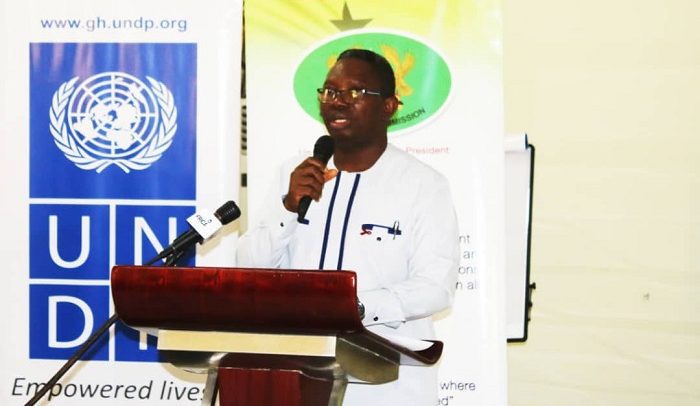The Ghana AIDS Commission (GAC) has urged journalists to use their respective media houses to educate people, reduce stigma and encourage behaviour change on HIV/AIDS
GAC made the call when it organized a training program for journalists in the Central Region on HIV/AIDS reporting.
It organized the program with support from the United Nations Development Programme (UNDP).
Speaking at the training, Kyeremeh Atuahene, the acting Director General of Ghana AIDS Commission, noted that stigmatization was making it difficult for people to check their status.
He added that HIV has no cure but there was a scientifically proven therapy to suppress the virus, which he said was the anti-retroviral (ART) that works when taken diligently.
However, as at December 2018, only 113,000 out of the nearly 335,000 persons living with HIV were on anti-retroviral treatment, he said.
This low uptake of ART, he said, was due to the fact that many diagnosed people are in denial of having the virus or are not aware of the treatment.
This, according to him, called for media capacity enhancement to ensure frequent education to inform people.
“I encourage you all to use your reach and influence to give people the information they need to protect themselves from HIV, educate them on the treatment in case they are infected with the virus and help reduce stigma and discrimination,” urged Mr. Atuahene.
Making a presentation on the HIV situation in the Central Region, Dr. John Oto, the Cape Coast Metro Health Director, observed that the Central Region with a population of about three million has over 26,000 persons living with HIV, comprising about 9,000 males and 17,000 females.
However, the Health Service has been providing anti-retroviral treatment to only about 68.2 percent of these persons living with HIV.
He emphasized that the media has more work to do to sensitize and educate people in order to achieve the National HIV and AIDS Strategic Plan (2016-2020) with the goal to end AIDS by 2030 and accomplish the “90-90-90 fast track target by 2020.
In explaining the strategy, Dr Oto indicated that by 2020, 90 percent of all people living with HIV are expected to know their status, 90 percent of people diagnosed with HIV infection are to receive sustained anti-retroviral therapy and 90 percent of people receiving anti-retroviral therapy would have viral suppression.
Participants expressed their gratitude to GAC and UNDP and noted that the training has broadened their knowledge and would enable them to raise more awareness on the importance of early detection of the virus.
They also assured the organizers that, going forward, more education would be tailored to help reduce HIV related stigma and discrimination to encourage uptake of HIV services.


